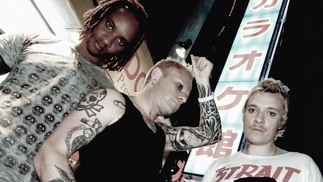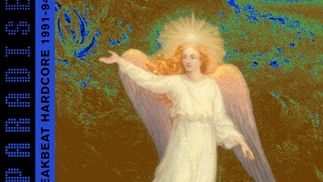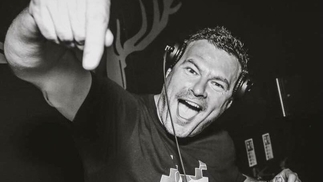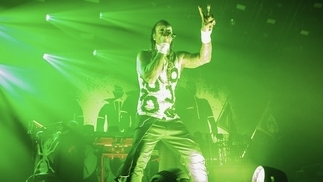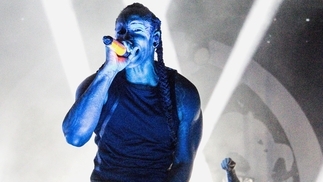The Prodigy's Liam Howlett: "We're braver than other bands"
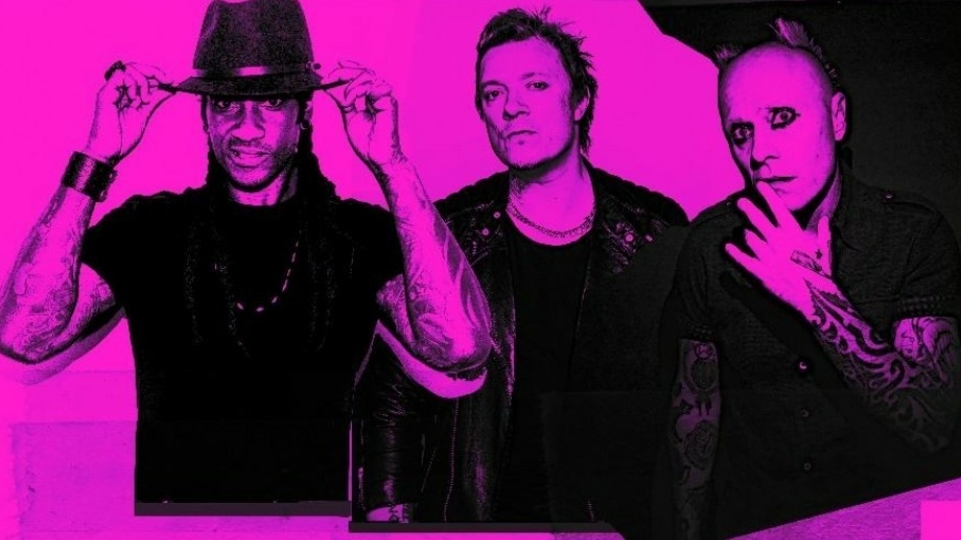
The Prodigy’s fans — nicknamed the Ant Army — are some of the most dedicated for any band. Ahead of their new album, Prodigy expert Martin James talks to producer Liam Howlett and some of their most passionate followers about what makes these electro punks so special...
A cold, damp day in North London, late in 2014. We’re in Liam Howlett’s King’s Cross studio listening to what would become The Prodigy’s sixth studio album ‘The Day Is My Enemy’. As the first single from the album, ‘Nasty’, snarls its way into the room, Liam Howlett turns the volume up, leans back in his swivel chair and grins. It is as fierce a cut and thrust of electronic punk as the band have yet managed. The ear-bleeding combination of analogue attack, Keith Flint’s rabid vocals and the relentless, thunderstruck beats combine to create an ambience of oppressive claustrophobia. The suffocating aggression only fully lets up with a brief drop, in which long-time collaborator Brother Culture utters the repeated words ‘I ain’t no tourist’ with militant defiance. In the punch-drunk mudslinging of shift-to-the-right post-UKIP Britain, it’s hard not to hear it as a political comment on immigration.
Almost four years later on a hot August day in 2018, we’re back in Liam’s studio to listen to the band’s seventh studio album and chew the fat over the making of the album, and that title. Just in case people missed the subtle call to arms issued by ‘Nasty’, Liam has christened this latest set ‘No Tourists’. In the time since that ‘Nasty’ playback, we’ve had Brexit, that shift right has become a full throttle lurch, the Tories have adopted UKIP’s voice and questions around borders and immigration are top of the daily political news agendas. At a time when the Windrush Generation have found themselves being repatriated, despite believing they held British passports, ‘No Tourists’ probably needs explaining.
“What, do you think people will reckon it’s about immigration?” asks a belligerent Liam. He’s standing in front of his mixing desk, flanked by analogue kit, an Orange amp and a randomly placed bright red front door with a singular number 7. As he looks at me, his temporary anger quickly changes to laughter. “Fuck ’em,” he exclaims. “I know what it means and it isn’t anything to do with politics. And if people think I am being political, well, I can’t stop people reading whatever they want into it. So fuck ’em.”
So what exactly is it about then, Liam?
“‘No Tourists’ is ultimately about escapism and fucking needing to be derailed. People have become lazier and forgotten how to explore. It’s hard not to be a tourist. You’re force-fed all this shit, and it’s hard not to go along with it and be lazy. The world’s forgotten how to explore, and we’re against that. We’re about needing... to explore another alternative route with the danger and excitement [of that]. Not following things just because it’s easy. ‘No Tourists’ is just a statement that you’ve got to try harder.”
So, it’s about the demand for more than the mindless, cultural Spotification that dominates our very existence. It’s about kicking against the pricks and just not rolling with the flow. The tourist in their definition is the spineless cool-seeker, bending with the strongest wind and following the easiest stream. If the previous album ‘The Day is My Enemy’ was an attack on the unchallenging, mindlessness of EDM, then this album gets to the heart of the cultural terrain that EDM belongs to. ‘No Tourists’ is intent on going to battle with easy-everything, from A-listing to X-Factor. Indeed, it’s an album philosophy that is hugely political.
GOOD ENERGY
The Prodigy’s need to push at the boundaries of expectation and experience life on the edge has seen them embrace everything from fast cars to extreme sports. Indeed, Keef’s need for speed resulted in him founding, and racing for, his own motorbike team TTC (Team Traction Control). Little surprise, then, that the band have taken the same approach to gigging. Since their earliest days, they’ve taken the poison to places where other bands feared to tread: places such as Russia, Romania, Macedonia and Serbia.
“We’re braver than other bands,” Liam says. “I never understood why people don’t go to these places. We went to Georgia for the first time this year. The people were really up for it. I always get these bands asking me why we play places like that, and I’m like, ‘Go there, it’s really fresh’, know what I mean? But these bands just stick to the same places.” Back in December 1995, the band’s determination to take the road less travelled found them playing a sold-out gig at the 10,000-capacity Pionir Hall in Belgrade, Serbia. The show was organised by a group of fans that included journalist Dragan Ambrozic, and proved to be culturally significant for the country’s youth. The Prodigy were the first big international act to play Serbia after the break up of Yugoslavia. The Dayton agreement in Bosnia had just been signed, UN sanctions over Serbia had been partially lifted and, much to the dismay of the Serbian youth, Slobodan Milosevic appeared to have foreign support to remain in power.
“The first gig The Prodigy played in Serbia was so important for the youth that its impact can still be felt 20 years later,” Serbian Prodigy fan Darko Stevi has said. “Those were the harsh days, [of] sanctions and restrictions for our country, the war was over, but the situation was bad. Nobody would even consider playing in Serbia. Bono and many others talked politics, but The Prodigy didn’t care about all of that shit. All that mattered for them was good music, good vibes, the energy. They gave us that. And we still feel it after all those years.”
Early in the set, revellers in the crowd lit torches that were so bright they were stronger than the lights from the actual stage itself. The band were shocked. But it was just a hint of the kind of fan reaction that would become commonplace at the shows that would follow the release of ‘Invaders Must Die’ in 2009. A younger group of fans emerged to replace the older ravers. This new group modelled themselves as the Ant Army after the band’s famed ant logo, and would pre-organise mosh pit mayhem via social media. In the wake of the Prodigy-curated Warrior Dance festivals in Japan, Serbia and Milton Keynes, the fans rebranded themselves Prodigy Warriors, a name that epitomised audience behaviours that were significantly different to the early days of on-one-matey, respectful hedonism.
“People now have definitely got the message that they come to a Prodigy gig to let go,” Liam says. “The turning point was ‘Invaders’. From then on, those were the best gigs we’ve done. People are just there to let off. It’s gone more hardcore for sure. Occasionally fights break out, but a lot of the time, Prodigy fans look after each other.”

FANATICAL
This is a point that immediately becomes clear on the band’s social media fan pages, where the Warriors obsessively share stories, tattoos, rare tracks, fan artwork and memorabilia collections. They actively police the internet for rip off memorabilia vendors on the make, and perhaps most intriguingly of all, hatch plans to meet up for the band’s gigs. With the announcement of the current tour, fans looked out for each other to make sure everyone got tickets. They grouped together to arrange pre-gig drinks, and with so many of them travelling through the UK and Europe, even organised ant invasions of specific hotels. Imagine the shocked faces of the people on reception desks as loads of tattooed up Prodigy fans descend on their lobbies. Electronic punk rave in the bar, anyone? No-one is going to stop them. “I think the majority of Prodigy nutters are good ’uns,” states Terence Cannon from Manchester. “That’s something this band has worldwide, such a mix of great, friendly people with the same mission in mind... to party.”
“It’s like a family,” explains Berlin-based fan Marcus Witt, aka Kiwi. “There’s the old school fans, collectors of records, artwork, memorabilia, gear, the frontline warriors, the wall of death warriors, the tattooed, travel-all-the-way-no- matter-where warriors, from Asia, South Africa, the USA. So many different kinds of fans, but all united through one thing: love and passion for The Prodigy.” One of the key organisers, Trixy Kostayava from France, continues: “We have those who started in underground clubs with the band. We have the crazy newcomers. We have the travellers. We have the ‘living on the edge’ fans from Eastern- Europe, the USA, and those who can’t make it easily, with disabilities, but they are there.” It’s in this last group of fans that the level of pure dedication becomes clear. Multiple sclerosis sufferer Kiwi explains how his love for the band has even impacted on his health. But that doesn’t stop him from travelling all over Europe to catch the band live.
“I wanted to go to Budapest, and all I wanted to hear was this one fuck off new tune called ‘AWOL’,” he says. “But my MS had been playing up in the week before, and I had only 17 hours’ sleep in one week. In that condition, I climbed on the train to Budapest. It took me 12 hours to get there. I had to spend a few hours waiting for the show, then afterwards I went to an after-party. I felt so tired that I had to lie down in front of the speakers and fell asleep. I was exhausted and it made me quite sick. But it was worth it for that one tune.”
The Ant Army metaphor keeps returning, as fans outline a togetherness that actually goes deeper than family. They come from all corners to meet, often to the detriment of their home lives. Londoner Paul Stoker talks of his dedication to the Warrior cause.
“I’ve travelled everywhere to see them,” he says. “I’ve even had girlfriends leave me because of my dedication to the band. I was supposed to be at a wedding on a day that The Prodigy were playing in Europe. I told my girlfriend I’d be at the wedding, but I went away to see the band instead. I wasn’t very popular.”
It’s Paul who most fans point to as a central figure in the Ant Army. The huge Prodigy tattoos across his back help him stand out, but so does his protective attitude towards his ant family. One fan that has polio talks of Paul saving her from the mosh pit after she’d taken a tumble. Even Liam Howlett mentions Paul’s name when talking about the fans. “We look after the fans, the ones who follow us around like Paul, we make sure they’re ok. It’s respect,” he says.
Paul is less enamoured with the idea of being singled out. “I just go to the gigs because I love the atmosphere and the fans,” he says. “I don’t even collect memorabilia or anything. I just live for the buzz of the gigs. Everyone is the same. I don’t consider myself or anyone else a better Prodigy fan than others. We’ve all got the same love and passion for this band.” “My man!” responds French fan Bernard Sourdingue to Paul’s statement. “This is the spirit.”
When Maxim announces from the stage, “This is for the real motherfuckin’ VIPs” and points to the front rows, it’s these guys he’s talking about: the warriors who go to extreme lengths and on occasion to their personal detriment to follow the band. From Liam Howlett’s onstage vantage point, he’s witnessed the shift in audiences from ravers to moshers, loved-up gurners to testosterone-fuelled warriors. I wonder what the best thing is that he’s seen in the Prodigy crowd? “Well, I always see a ‘fuck David Guetta’ sign that pops up, and that always amuses me,” he laughs. ‘But the best thing recently was the ant man in Russia. At the first show I saw this guy in the crowd dressed head to toe in a leather ant suit. It was a full body leather suit with a leather full head mask, and extra arms attached to his own arms. I was like, ‘Am I tripping? Did I see someone dressed as an ant? We gotta get him backstage’.
“We put him on the guest list for the other Russian shows, and at the last one in Moscow he was walking down the street with this full suit on and he got arrested. It’s against the law to cover your head in public in Moscow ’cause of terrorism. Once he explained to the police, ‘Hey, I’m just a ant trying to get to a gig here, they let him go!”
The level of fanaticism displayed by the band’s followers is unusual in today’s unchallenging cultural climate. It’s a type of dedicated, obsessional fandom that is all too rare. It’s a state of mind that involves sacrifice, dedication and more than a little bit of life lived at the extreme edges. In fact, much like the band themselves, these fans are certainly no tourists.
“The dedication of it amazes me man,” Liam agrees. “I’ve got total respect”
